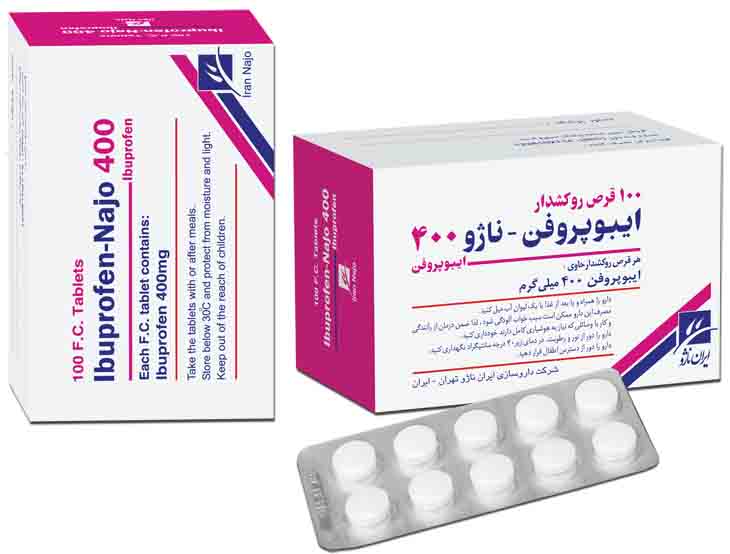
Ibuprofen
ľNajo 400 F.C. TAB

Category: ANTIINFLAMMATORY AND ANTIRHEUMATIC PRODUCTS, NON-STEROIDS
INDICATIONS: Ibuprofen tablets are indicated for relief of the signs and symptoms of rheumatoid arthritis and osteoarthritis, mild to moderate pain, treatment of primary dysmenorrhea.
DOSAGE AND ADMINISTRATION: Do not exceed 3600 mg total daily dose. If gastrointestinal complaints occur, administer Ibuprofen tablets with meals or milk.
Rheumatoid arthritis and osteoarthritis, including flare-ups of chronic disease
Suggested dosage: 1200 mg-3200 mg daily (400 mg, 600 mg t.i.d. or q.i.d.). Individual patients may show a better response to 3200 mg daily, sufficient increased clinical benefits to offset potential increased risk.
In chronic conditions: a therapeutic response to therapy with Ibuprofen is sometimes seen in a few days to a week but most often is observed by two weeks. After a satisfactory response has been achieved, the patient's dose should be reviewed and adjusted as required.
Juvenile arthritis: The usual dose is 30 to 40 mg/kg/day divided into 3 or 4 doses. Patients with milder disease may be adequately treated with 20 mg/kg/day. Doses above 50 mg/kg/day are not recommended.
Fever reduction in adults: 400 mg every 4-6 hours as necessary.
Mild to moderate pain: 400 mg every 4 to 6 hours as necessary for the relief of pain in adults.
Dysmenorrhea: For the treatment of dysmenorrhea, beginning with the earliest onset of such pain, Ibuprofen children's suspension should be given in a dose of 400 mg every 4 hours as necessary for the relief of pain.
CLINICAL PHARMACOLOGY: Ibuprofen which possesses analgesic and antipyretic activities. Its mode of action is not completely understood, but may be related to prostaglandin synthetase inhibition.
Pharmacokinetics: Ibuprofen is rapidly absorbed. Peak serum Ibuprofen levels are generally attained one to two hours after administration. The bioavailability of the drug is minimally altered by the presence of food. The serum half-life is 1.8 to 2.0 hours.
CONTRAINDICATIONS: Hypersensitivity to the drug or in individuals with the syndrome of nasal polyps, angioedema, and bronchospastic reactivity to aspirin or other nonsteroidal anti-inflammatory agents. Anaphylactoid reactions have occurred in such patients.
PRECAUTIONS:
General: Blurred and/or diminished vision, Fluid retention and edema.
Liver effects: borderline elevations of one or more liver function tests may occur in up to 15% of patients. Severe hepatic reactions, including jaundice and cases of fatal hepatitis, have been reported.
Hemoglobin levels: A slight dose-response decrease in hemoglobin/hematocrit was noted.
Aseptic meningitis: aseptic meningitis with fever and coma has been observed on rare occasions.
Renal effects: there have been reports of acute interstitial nephritis with hematuria, proteinuria, and occasionally nephrotic syndrome. Since Ibuprofen is eliminated primarily by the kidneys, patients with significantly impaired renal function should be closely monitored; and a reduction in dosage should be anticipated to avoid drug accumulation.
Pregnancy: Administration of Ibuprofen is not recommended during pregnancy.
Nursing Mothers: Ibuprofen is not recommended for use in nursing mothers.
OVERDOSAGE: In cases of acute overdosage, the stomach should be emptied by vomiting or lavage, though little drug will likely be recovered if more than an hour has elapsed since ingestion. Because the drug is acidic and is excreted in the urine, it is theoretically beneficial to administer alkali and induce diuresis. In addition to supportive measures, the use of oral activated charcoal may help to reduce the absorption and reabsorption of Ibuprofen.
SIDE EFFECTS: Incidence greater than 1% (but less than 3%): nausea, epigastric pain, heartburn, diarrhea, abdominal distress, nausea and vomiting, indigestion, constipation, abdominal cramps or pain, fullness of GI tract (bloating and flatulence), dizziness, headache, nervousness, rash (including maculopapular type), pruritus, tinnitus, decreased appetite, edema, fluid retention (generally responds promptly to drug discontinuation)
DRUG INTERACTION: Coumarin-Type Anticoagulants, Aspirin, Methotrexate, H-2 Antagonists, Furosemide, Lithium.
How Supplied: Each Package of Ibuprofen-Najo 400 contains 10 Blisters and 100 F.C. Tablets.
storage: Store at controlled room temperature to 30░C. Protect from light and moisture.
For more information please refer to:
USPDI for Professional Health Care, 2007, page 375.
IRAN NAJO PHARMACEUTICAL COMPANY
www.irannajo.com
Address: No. 153, West Hoveiseh,
Sabounchi St., Sohrevardi Ave., Tehran 1533693317, Iran
Tel: +9821-88747363 Fax: +9821-88740644 info@irannajo.com